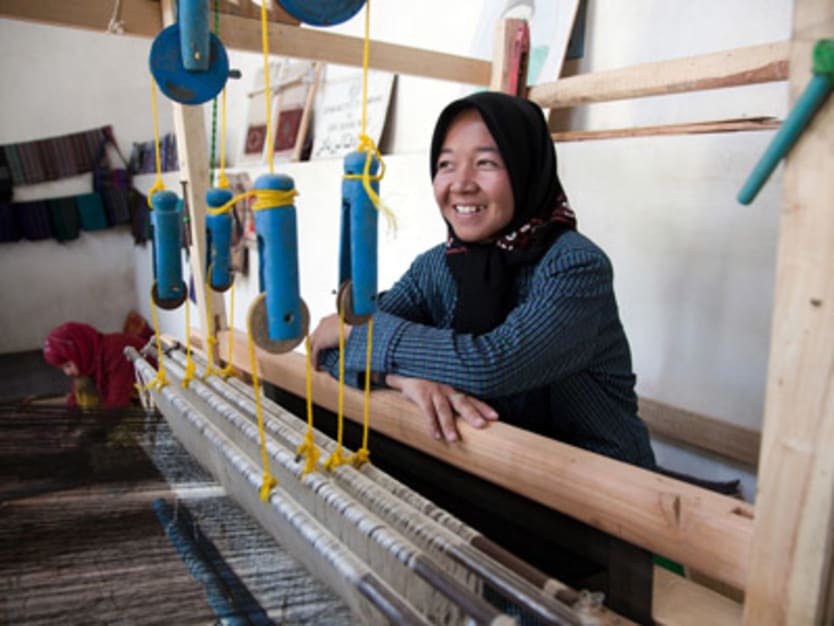
The World Bank and the Afghan Ministry of Finance recently signed a $50 million grant to support the government’s efforts to improve access to credit for micro, small and medium enterprises through the Afghanistan Access to Finance Project.
Of the total $32 million will be provided to support the microfinance sector and scale up the Targeting the Ultra Poor program that provides technical and financial support to poorest households to help them graduate out of extreme poverty. The remaining $18 million will support the expansion of the Afghanistan Credit Guarantee Facility, that provides partial risk guarantees to loans issued by commercial banks and microfinance institutions to small and medium enterprises.
“We believe the [AAFP] will pay a critical role in the coming years in supporting households as well as small and medium enterprises to gain an increased access to financial services, notably credit,” said Robert Saum, World Bank country director.
Despite the fact that $641.7 billion has been spent in military, reconstruction and civilian aid in the past decade, Afghanistan’s unemployment and poverty levels have remained significantly high. A 2013 survey by the Asia Foundation indicated that 25 percent of Afghans identified unemployment as one of the biggest problems for the country’s progress. The unemployment problem has been exacerbated by the annual entry of 400,000 young people to the labor market, which cannot absorb the unemployed young workers and it forces them either to leave in search of work in neighboring countries, or to the streets where they often get involved in crime.
The living standard of people in Afghanistan has also been affected by rampant unemployment. According to the World Bank, Afghans with jobs — whether part-time or full-time — make an average $410 per year or a little over a dollar a day. Available government figures show that 60 percent of children are malnourished and 27 percent of the population has no access to safe drinking water.
Creating jobs to fight poverty
The government of Afghanistan, along with a number of national and international organizations, has taken some major steps to address the prevalent unemployment and poverty problems in the country.
The Afghanistan Enterprise Development Programme by the Ministry of Rural Rehabilitation and Development is a vital move aimed at creating job opportunities and eliminating poverty. The main purpose of this new initiative is to harness the potential of the private sector for inclusive economic growth and sustainable job creation in rural Afghanistan over a period of ten years.
In another move, the Ministry of Information and Culture, with technical and financial support of UNFPA, UNICEF, UNDP, ILO and Counterpart International, prepared in June 2013 the draft of Afghanistan’s first National Youth Policy.
“Once [Afghan President] President Karzai signs the National Youth Policy, it will serve as a guiding document for all new programmes. The policy will serve to guide the development of a five-year National Youth Strategy,” said Sayed Saiedy, director of policy and programs for youth affairs at the Ministry of Information and Culture.
Dr. Laurent Zessler, UNFPA country representative, added: “Youth empowerment, development, ASHR and youth reproductive rights are at the core of UNFPA’s mandate and we will continue to work closely with the government, youth and reach out to provide opportunities to the most vulnerable and marginalized youth, in particular girls.”
What the Afghan youth needs
The National Youth Policy, under the key intervention policy, has emphasized the need for the promotion of sustainable youth entrepreneurship through increasing young people’s access to sustainable finances, increased financial literacy and business skills, work experience opportunities for youth — including through formal and informal apprenticeship — and public and private internship programs.
The document also calls for the expansion of youth-specific employment services and career education, including through the establishment of youth job centers.
Free and universal access to quality education and training to build the capacity of young people and a strong human resource base, the promotion of decent employment opportunities for young women and men — in particular for young women and person with disabilities and in rural areas — and the design and implementation of programs to build self-confidence, leadership skills, life skills and resilience of young women and men, all need to be addressed as well.
All these efforts are significant for creating job opportunities, eradicating poverty and developing a healthy business environment for better economic growth and development in the long run in Afghanistan, where the government must lead and coordinate all these interventions to ensure the effectiveness and efficiency and a smooth flow of technical information and exchange of experience among the stakeholders.
Supporting business
Meanwhile, entrepreneurs and SMEs play a crucially important role in creating employment opportunities and economic growth, need to be fully equipped with the required business knowledge and skills.
They must be familiar with national and international standards as well as consumers’ rights, fair competition principles and environmental impacts assessment and management.
Furthermore, Afghan entrepreneurs should be connected to national, regional and international markets and their products need to be promoted at all levels. Most of them complain of lack of access to short- and medium-term loans, no foreign markets for their products and inability to compete with much cheaper imported products.
“Entrepreneurs and SMEs are the backbone of economic growth and play a very important role in creating job opportunities,” said Mr. Mohammad Abrar, a training and development specialist in Afghanistan. “Therefore, the national and international organizations along with the government … should help [them] have access to short and medium terms loans and build their skills in business planning, marketing, packing, business management, numeracy and financial management and help them understand national and international standards, fair competition and consumers’ rights to successfully establish and run their businesses.”
Join the Devex community and access more in-depth analysis, breaking news and business advice — and a host of other services — on international development, humanitarian aid and global health.








